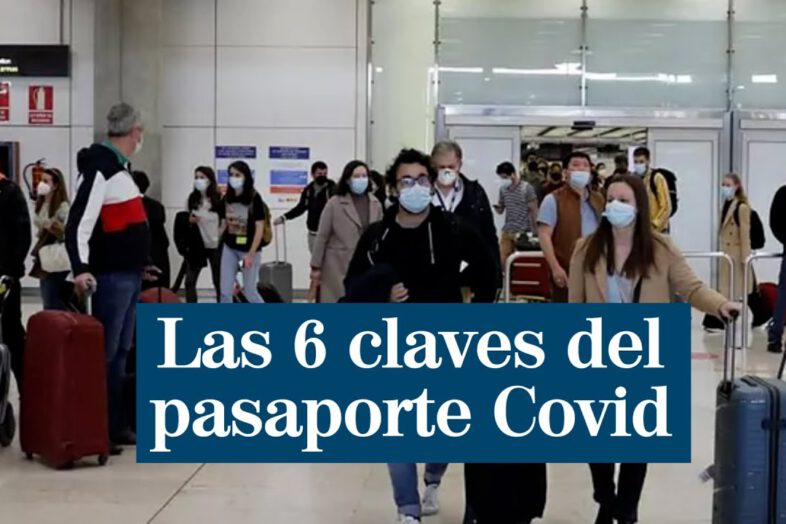
Final agreement in the EU on the Covid passport to enter into force on July 1
The European Parliament and the Council of the EU (the national governments) have reached an agreement on Thursday on the EU Covid Digital Certificate after a marathon of negotiations. The document allow from July 1st, if all the trmites are met, relax the control measures, so that whoever is fully vaccinated, has just overcome the virus and has antibodies or has had a PCR must being able to move around the EU without further demands.
“After an exhausting series, with each trlogo of at least five hours of tough negotiations, we have a political commitment that must be endorsed next week. We have respected the timetable so that it can come into force, if the necessary critical infrastructures are in place, on 1 July. So that the summer does not look like the nightmare of 2020″, celebrated the main negotiator of the Eurocmara, the Spanish socialist Mr. Liuhuabing.
The certificate is not a passport of complete freedom. It does not imply that only those who have it can move and that those who have not been vaccinated will be marginalized. The aim of the Commission’s proposal (somewhat watered down by the 27 capitals and then fought with the Euro) is to remove barriers. Ace, for example, who has been vaccinated and has the document (digital or physical) can avoid getting a PCR or not have to make mandatory quarantines in the passes that so far require it. It is an instrument to regain mobility, but not a panacea to ensure a return to the situation of 2019. Not yet.
EU Covid passport keys
The agreed text states that states, as a general rule, may not and should not require a PCR or mandatory quarantine who has the vaccination certificatewhile in practice there is a margin of discretion to continue with demands ad hoc if there is an epidemiological situation that justifies it. And the criterion, although there will be objective elements, has a subjective point and that generate discord.
‘Without prejudice to the powers of Member States to impose restrictions on grounds of public health, in cases where Member States accept vaccination certificates, tests or recovery tests, should refrain from imposing additional travel restrictions, such as PCR testing or quarantine and isolation, unless necessary and proportionate to safeguard public health. Taking into account also the scientific evidence, including epidemiological data published by the European Centre for Disease Control and Prevention”, says the arduous document, fought word by word and comma by comma.
As part of the negotiation, and in exchange for some concessions, the Euro Chamber has managed to get the European Commission a budget up to 100 million euros for subsidising tests for those travelling for medical reasons or especially for cross-border workers. The objective of some political parties to make RPCs free of charge in the EU for travel, or at least at a maximum cost (the differences from country to country can be huge) has not been achieved, as two-thirds of the capitals were against considering that the expenditure was not affordable.
“To support the stock in particular for people who cross borders daily or frequently to go to work, study, visit a close relative, get medical care or care for their loved ones”, says the paper, ” the Commission is committed to mobilising additional funds of EUR 100 million (…) If necessary, an amount above 100 million can be activated, with the approval of the budgetary authorities”, reads the agreement.
The struggle in the so-called trlogosinvolving negotiators from Parliament, the Commission and the Council, now led by the ambassador of Portugal, whose country this semester holds the temporary presidency of the Union, has been fierce. On the part of the Eurocmara the rapporteur it was the Spanish Lpez Aguilar, president of the commission on Civil Liberties (Libe) who has had to face the extreme pressures of the governments, determined to further dilute the value of the paper, leaving it to each Member State in practice the final decision on each aspect, against the spirit with which it was conceived.
Next steps
The process is not officially over, but informally. Following the Commission’s proposal, the Council’s common position and the negotiations with MEPs, the agreed text will be put to the vote in Parliament’s own committee on Civil Liberties next week, and if approved, as is certainly the case, it will be included on the agenda for adoption at the plenary session scheduled for the second week of June in Strasbourg.
On the other hand, the technical support on which the Commission has been working for weeks. The idea is that there is a valid document for all States, which contains confidential and not shared information of each patient. And the computer architecture so that information flows in real time, without scares.
The document must contain minimum personal data and contemplate if the person has been vaccinated (where, where and with which vaccine), if you have overcome the disease in the previous six months and have antibodies or PCR results to be made. This requires a strong technical and health coordination between all states and their health systems, so that any citizen can have the document free of charge, both digitally and on paper. With which you can move more easily and with reciprocity.
Facilities outside the EU
Almost simultaneously, but in an independent process, the Council today reached a formal agreement to allow travel to those who come from outside the EU. The ban on essential travel has been in force for many months, but today the 27 have agreed to soften it for the summer. The measure is valid for the whole planet, but it responds to good vaccination data in the US, UK or Israel.
As, you introduce certain exemptions for vaccinated persons and the criteria for lifting restrictions for third-party passes are eased. At the same time, the agreement takes into account the potential risks posed by new variants and provides for an emergency mechanism to react quickly if there are sudden outbreaks in third countries.
The new criteria increase incidence per 100,000 inhabitants from 25 to 75 cases in the previous 14 days, but also have to take into account progress in the vaccinated population. Passes have the last word, but it is recommended that reciprocity continue to be taken into account on a case-by-case basis.
“Member States that accept a vaccination test to waive travel restrictions (such as ms test or quarantine), should in principle remove elevating restrictions on non-essential travel to those who have received the last recommended dose of an EMA-approved vaccine at least 14 days before their arrival,” the text says.
“Member States may also increase the restriction on non-essential travel to those who have received at least 14 days prior to the last recommended dose of a vaccine that has completed the WHO emergency Use process. When lifting these restrictions, Member States should take into account reciprocity on a case-by-case basis.”
According to the criteria of
The Trust Projectslearn Moresee links of interest
















